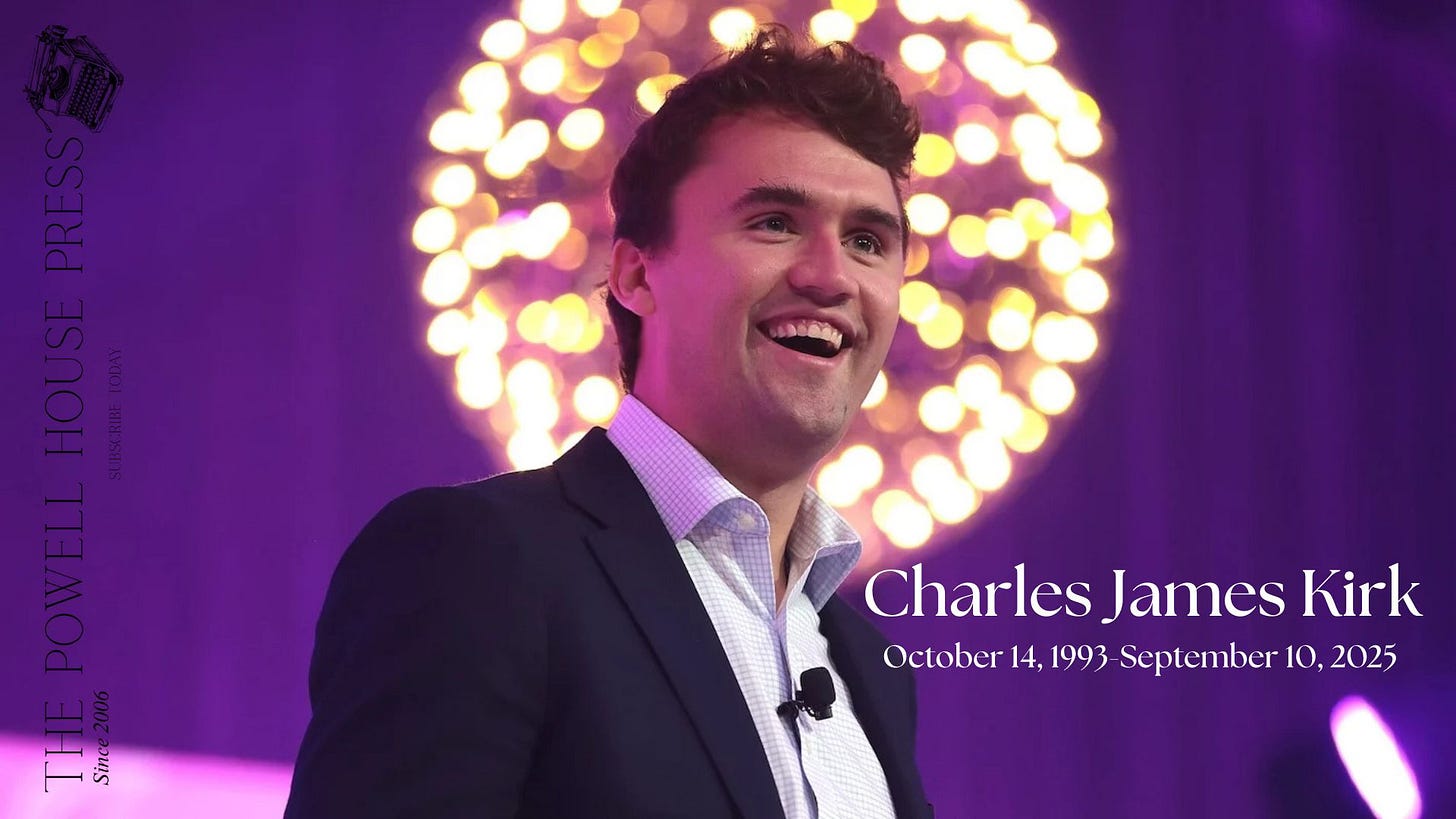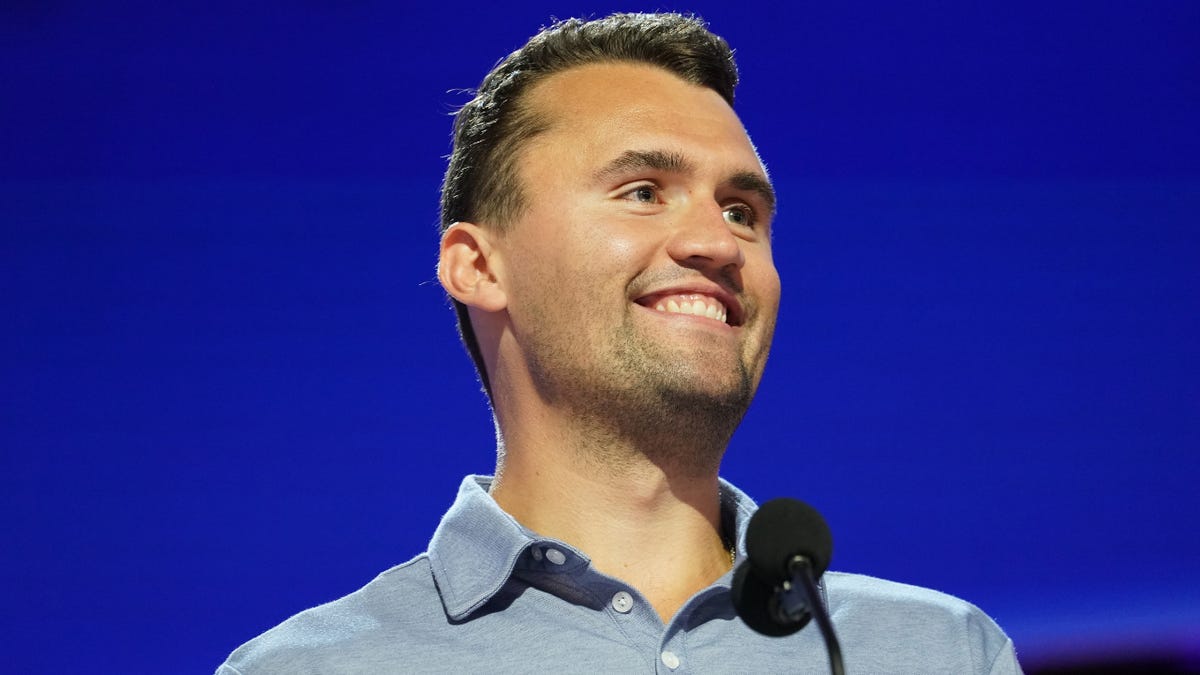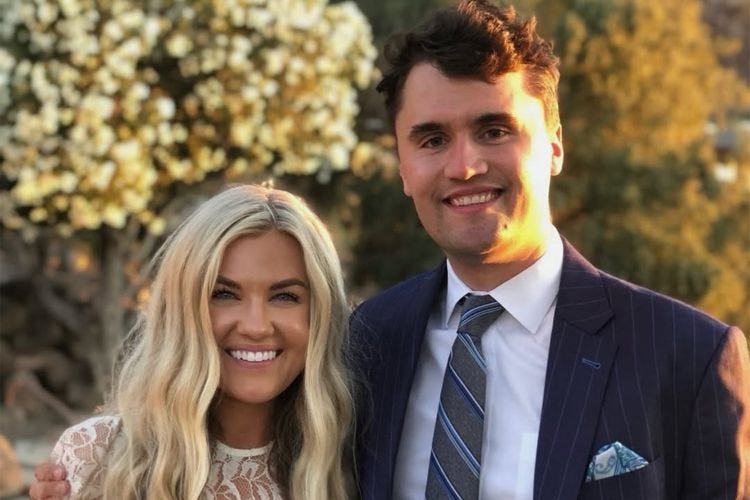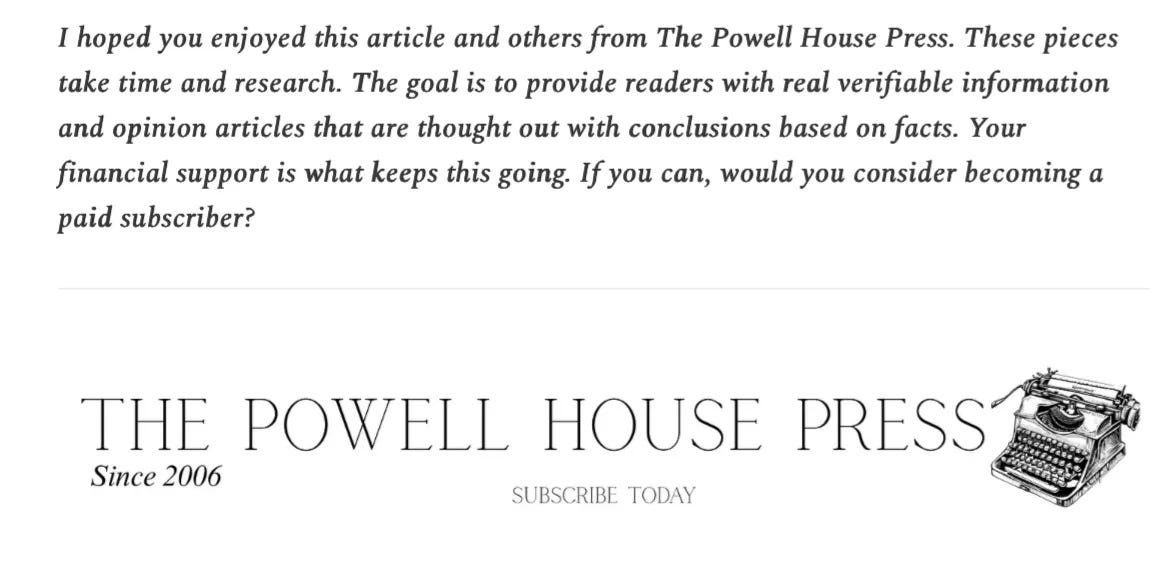The Dropout Prophet. Who Was Charlie Kirk?
Learn About The Man Who Built a Conservative Empire on One Semester of Education and a Lifetime of Rage
So, who was Charlie Kirk? Seems odd that I've written so much about him in the past week. Aside from Trump and RFK Jr., I try to spread the love around, but this week it's been Charlie almost all the time. The why has been important. His death has caused such chaos. The flag at half-mast: the death of former President Jimmy Carter and the Pope—and now of course Charlie Kirk. Jimmy Kimmel taken off the air. Pam Bondi threatening to arrest those who said a bad word about him. Many people lost their jobs for posting their thoughts on him online. All of this is worth examining. But it doesn't tell people much about who he was as much as it has told us about who we are. So here is some information on Charlie Kirk and who he will be remembered as. Like all of us, there is more to him than a two-thousand-word essay. I read a lot about him and watched and listened to several hours of him in "debates," his podcasts and other public events. He seemed very polite, but that did not make him seem less menacing to me. In fact, these are the types of people that actually scare me the most. But, that's me.
When I first started watching him on YouTube there was something almost cartoonish about him—the kind of aggressively wholesome, all-American boy-next-door packaging that seemed engineered in a Republican focus group. At 31, he still carried himself with the eager-to-please energy of a high school class president, all wide grins and firm handshakes, the kind of young man your conservative aunt would have absolutely adored at Thanksgiving dinner. Until, that is, he opened his mouth.
"If I see a Black pilot, I'm going to be like, 'Boy, I hope he's qualified,'" Kirk had declared on his podcast in January 2024, with the casual confidence of someone who genuinely believed he was making a reasonable point. It was, I came to learn, vintage Charlie Kirk—the ability to package the most inflammatory rhetoric in the sunny disposition of a youth pastor, complete with the unshakeable conviction that he was America's truth-teller.
Kirk had built an empire on this contradiction, transforming himself from a community college dropout into one of the most influential voices in American conservatism, commanding audiences of millions through his organization Turning Point USA and his daily podcast "The Charlie Kirk Show." He was the rare political figure who could fundraise at Mar-a-Lago galas while simultaneously telling Taylor Swift to "submit to your husband" on air, all while maintaining that boyish grin that had become his trademark.
To understand how Kirk achieved such influence despite his modest beginnings, I looked at his carefully constructed origin story, which read like conservative movement fan fiction. Born in 1993 and raised in the affluent Chicago suburb of Prospect Heights, he was the son of Robert Kirk, an architect, and grew up in the kind of upper-middle-class comfort that bred both confidence and grievance in equal measure. Early profiles painted him as a precocious political junkie, the type of teenager who chose to spend his free time reading National Review instead of playing video games.
But Kirk's educational trajectory told a different story than the boy-genius narrative his supporters preferred. After graduating from Wheeling High School, he enrolled at Harper College, a local community college—hardly the launching pad one might expect for someone who would later lecture Supreme Court justices about their intelligence. He lasted exactly one semester.
"I realized that I was paying to be indoctrinated," Kirk would later explain, a line that became conservative gospel but conveniently obscured the more mundane reality that many 18-year-olds struggle with college. What was remarkable wasn't that Kirk dropped out—it was how he managed to spin that dropout status into a credential, positioning himself as too smart for school, too authentically American for the ivory tower elite. Even when his struggle was with community college coursework.
The transformation from college dropout to conservative wunderkind happened with suspicious speed. In 2012, at just 19, Kirk founded Turning Point USA with backing from prominent Republican donors, including Charlie Kirk's eventual patron saint, Foster Friess. The organization's stated mission was to promote conservative values on college campuses, but Kirk's real genius was recognizing that there was more money and attention in being provocative than in being persuasive.
This insight would drive Kirk's approach to campus activism, which became the stuff of legend—and depending on your politics, either inspiration or horror. Armed with a simple formula of showing up at liberal universities with inflammatory talking points and a camera crew, Kirk mastered the art of turning student outrage into viral content. He wasn't interested in converting minds; when you watch the videos it was clear he was building a brand.
"We record all of it so that we put [it] on the internet so people can see these ideas collide," Kirk had explained, with the matter-of-fact tone of someone describing a particularly successful marketing campaign. And it was marketing—brilliant, cynical, and devastatingly effective.
The young man who once struggled through a single semester at community college was now lecturing college students about everything from economics to constitutional law, armed with nothing more than talking points and supreme confidence. When students challenged him on complex policy issues, Kirk had perfected the art of deflection through personal attack, questioning not just their arguments but their right to make them.
"You do not have the brain processing power to otherwise be taken really seriously," he said of Joy Reid, Michelle Obama, Sheila Jackson Lee, and Ketanji Brown Jackson in July 2023. "You had to go steal a white person's slot to go be taken somewhat seriously." It was pure Kirk—the ability to package racist rhetoric in what he thought was intellectual critique, delivered with the earnest conviction of someone who genuinely believed he was the smartest person in the room.
Central to Kirk's carefully constructed public persona was his relationship with Christianity—perhaps no aspect of his identity was more deliberately crafted. Raised in what he described as a Christian household, Kirk had weaponized faith with the precision of a seasoned serial killer, using religious language to sanctify positions that would otherwise sound simply cruel.
"The one issue I think that is so against our senses, so against the natural law, and dare I say, a throbbing middle finger to God, is the transgender thing happening in America right now," Kirk declared during a September 2023 church speech. He called transgender people "an abomination," referencing biblical passages about stoning while maintaining the posture of a faithful Christian simply following scripture.
It was a masterful performance—Kirk as righteous prophet, speaking uncomfortable truths to a fallen world. Never mind that his interpretation of Christianity seemed remarkably aligned with his political positions, or that his rhetoric often contradicted the very Christian principles of love and compassion he claimed to champion. Kirk had managed to position himself as both persecutor and persecuted, using his faith as both sword and shield.
Kirk's increasingly aggressive rhetoric extended far beyond religious commentary, particularly when it came to his views on women, which revealed perhaps the most retrograde aspects of his worldview. Packaged in the language of traditional values but delivered with a venom that suggested deeper anxieties about changing gender roles, his August 2025 message to Taylor Swift—"Reject feminism. Submit to your husband, Taylor. You're not in charge"—wasn't an outlier but the logical conclusion of years of escalating attacks.
At an April 2024 Turning Point event, Kirk painted a picture of modern womanhood that sounded like something from The Handmaid's Tale: "If you are a 32-year-old young lady who went to college, who has a nice apartment, a corporate job, and cats, you know, you're a Democrat voter, right?" The contempt was palpable—for education, for independence, for any woman who dared to construct a life outside traditional parameters.
But Kirk's misogyny extended beyond cultural commentary into pseudoscientific territory. "Birth control like really screws up female brains," he declared at the same event. "It increases depression, anxiety, suicidal ideation... It creates very angry and bitter young ladies and young women." It was the kind of statement that would have been laughable if it weren't so dangerous—medical advice from someone whose formal education ended after one semester of community college.
Even more troubling was Kirk's rhetoric about immigration and demographics, which revealed his role in mainstreaming white nationalist talking points for conservative audiences. He spoke openly about "the great replacement strategy" and warned that Democrats "hate those of you that live in rural and small America" and "have a plan to try and get rid of you."
The language was carefully calibrated—just subtle enough to maintain plausible deniability while clear enough to send the intended message. When Kirk referenced "Operation Wetback" as a model for immigration policy or described migrants as "the men that will go into your communities and break into your homes and rape your women, take your children," he wasn't just advocating policy positions—he was trafficking in the oldest and most dangerous forms of American racial paranoia.
Perhaps most shocking had been Kirk's recent turn toward antisemitic rhetoric, particularly given his previous support for Israel. Following the October 7, 2023, attacks, Kirk began promoting conspiracy theories about Jewish control of American institutions that would have been familiar to readers of The Protocols of the Elders of Zion.
"Jewish communities have been pushing the exact kind of hatred against whites that they claim to want people to stop using against them," Kirk declared in November 2023. He claimed that Jews controlled "not just the colleges; it's the nonprofits, it's the movies, it's Hollywood, it's all of it," employing antisemitic tropes with the same casual confidence he brought to all his provocations.
The transformation had been startling, even for Kirk's critics. The young man who once positioned himself as Israel's greatest campus defender now promoted theories about Jewish manipulation that echoed the darkest corners of American extremism.
None of this would have mattered if Kirk had been simply another internet provocateur screaming into the void. But Kirk had built something far more substantial—a media empire that reached millions of Americans daily, a pipeline that funneled young conservatives toward increasingly extreme positions.
Turning Point USA claimed chapters on over 2,500 high school and college campuses. Kirk's podcast regularly ranked among the most popular conservative shows. His social media following numbered in the millions. He commanded speaking fees that would have made seasoned politicians envious and had the ear of major Republican donors and politicians.
The boy who couldn't make it through one semester at community college now lectured Supreme Court justices about constitutional law. The dropout who once struggled with basic coursework held forth on complex medical and scientific topics with supreme confidence. It was a peculiarly American story—the triumph of charisma and conviction over expertise and education.
Kirk's death came as he was doing what he had always done best—provoking a crowd on a college campus. The American Comeback Tour was set to be another season of the campus provocations that had made him famous, beginning at Utah Valley University on September 10, 2025. As he engaged with an audience member about mass shootings, Kirk was shot in the neck by a gunman positioned on the roof of a building approximately 142 yards away. He was pronounced dead at a nearby hospital after undergoing emergency surgery.
The irony was impossible to ignore—a man who had built his career on inflammatory rhetoric about political violence became its victim while discussing the very topic that had long consumed American political discourse. Kirk's assassination occurred during a period of deepening division and increasingly frequent violence in American politics.
What was most unsettling about Charlie Kirk wasn't his extremism—American politics had always had its share of provocateurs and demagogues. It was his youth, his influence, and his apparent imperviousness to shame or self-doubt. At 31, he had already spent more than a decade in the public eye, transforming himself from suburban dropout to movement leader through sheer force of personality and an uncanny ability to sense which way the wind was blowing.
Kirk represented something new in American conservatism—a generation of activists who came of age in the social media era, who understood that attention was the only currency that mattered, and who discovered that the most inflammatory rhetoric often generated the biggest audiences. He wasn't an aberration but a harbinger, a preview of what happened when politics became performance art and provocateurs became prophets.
"I can't stand the word empathy, actually," Kirk had declared in October 2022. "I think empathy is a made-up, new age term that does a lot of damage." It was perhaps the most revealing statement he ever made—not because it was particularly shocking, but because it was so honest. In Kirk's world, empathy wasn't just unnecessary; it was actively harmful, an obstacle to the kind of ruthless political combat that built empires and destroyed enemies.
The real tragedy wasn't that Charlie Kirk existed—it was that in contemporary America, he had thrived. The dropout who couldn't handle community college became one of the most influential voices in conservative politics, proof that in our media ecosystem, conviction mattered more than credentials, and provocation paid better than principle.
His death at 31 cut short a career that had come to define the most provocative wing of American conservatism. As Kirk himself might have said, with that trademark grin and supreme confidence: "It's just true."
Charlie Kirk is survived by his wife Erika Frantzve Kirk and their two young children. Erika, a former Miss Arizona USA, is currently pursuing a doctorate in Biblical Studies at Liberty University and has been described as a social entrepreneur, passionate ministry leader, and woman of deep faith. She was a frequent presence by her husband's side at speaking engagements and public appearances, often introducing him at Turning Point USA events where she would praise him as both a public fighter for conservative causes and a devoted father and husband behind closed doors.
Following Charlie's death, Erika was named the new CEO and Chair of the Board for Turning Point USA, vowing to continue her late husband's work and ensure his legacy lives on.
The couple shared two young children—a daughter who turned 3 in August 2025 and a son who turned 1 in May 2024.







Thank you for your clear and well-researched summary of this man’s life and legacy. The US media firestorm and hysteria over Kirk's murder has left us Brits poised between amused bewilderment and complete indifference. He was virtually unknown here apart from some hilarious YouTube videos of him being eviscerated when he took on students from the Cambridge University debating society earlier this year. There are no mass youth movements in the UK resembling Turning Point, or religious social media youth influencers with anything like the reach that Kirk has in the US.
40% of our population self identify as nominally Christian (as opposed to Hindu, Muslim, non-believer etc,) but just 6% (yes folks, just 6%) describe themselves as ‘active’ Christians, ie regular church attenders. Only a fraction of that 6% subscribe to the fundamentalist, Creationist, take-the bible-literally, waiting for the Rapture, Liberals are Demons, submit to your husband flavour of religion that Kirk espoused and is currently being embraced by MAGA. It is utterly alien to the vast majority of us, unless you're an aficionado of Netflix documentaries and reality TV shows about American religious cults.
Sure, we have plenty of racists, conspiracy theorists and science deniers on this side of the pond but we don't see these beliefs being justified using religious fuckwittery.
In an earlier iteration Charlie Kirk would have owned a car dealership and been active with the chamber of commerce while doing coke on the weekends and cheating on his wife every chance he got. Run Rabbit Run